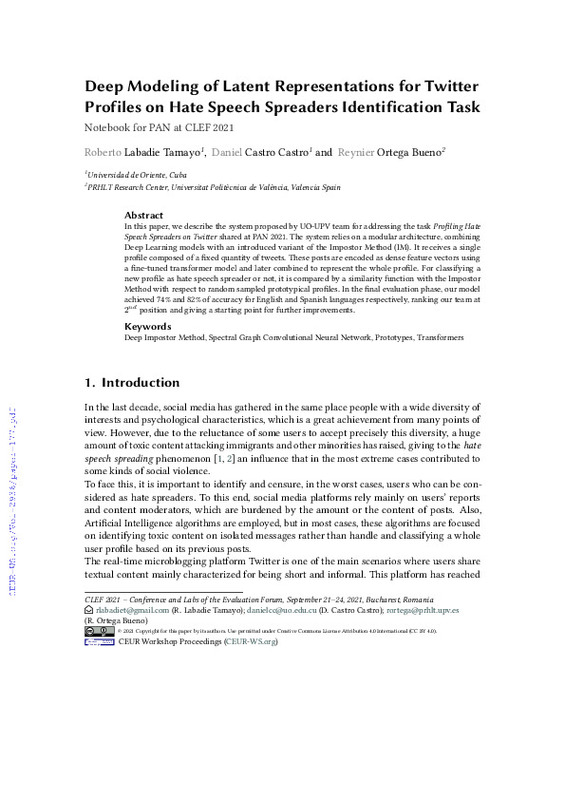JavaScript is disabled for your browser. Some features of this site may not work without it.
Buscar en RiuNet
Listar
Mi cuenta
Estadísticas
Ayuda RiuNet
Admin. UPV
Deep Modeling of Latent Representations for Twitter Profiles on Hate Speech Spreaders Identification Task
Mostrar el registro sencillo del ítem
Ficheros en el ítem
| dc.contributor.author | Labadie Tamayo, Roberto
|
es_ES |
| dc.contributor.author | Castro Castro, Daniel
|
es_ES |
| dc.contributor.author | Ortega-Bueno, Reynier
|
es_ES |
| dc.date.accessioned | 2022-12-14T11:47:00Z | |
| dc.date.available | 2022-12-14T11:47:00Z | |
| dc.date.issued | 2021-09-24 | es_ES |
| dc.identifier.issn | 1613-0073 | es_ES |
| dc.identifier.uri | http://hdl.handle.net/10251/190669 | |
| dc.description.abstract | [EN] In this paper, we describe the system proposed by UO-UPV team for addressing the task Profiling Hate Speech Spreaders on Twitter shared at PAN 2021. The system relies on a modular architecture, combining Deep Learning models with an introduced variant of the Impostor Method (IM). It receives a single profile composed of a fixed quantity of tweets. These posts are encoded as dense feature vectors using a fine-tuned transformer model and later combined to represent the whole profile. For classifying a new profile as hate speech spreader or not, it is compared by a similarity function with the Impostor Method with respect to random sampled prototypical profiles. In the final evaluation phase, our model achieved 74% and 82% of accuracy for English and Spanish languages respectively, ranking our team at 2¿¿ position and giving a starting point for further improvements. | es_ES |
| dc.description.sponsorship | The work of the third author was in the framework of the research project MISMIS-FAKEnHATE on MISinformation and MIScommunication in social media: FAKE news and HATE speech (PGC2018-096212-B-C31), funded by Spanish Ministry of Science and Innovation, and DeepPattern (PROMETEO/2019/121), funded by the Generalitat Valenciana. | es_ES |
| dc.language | Inglés | es_ES |
| dc.publisher | CEUR | es_ES |
| dc.relation.ispartof | Proceedings of the Working Notes of CLEF 2021, Conference and Labs of the Evaluation Forum, Bucharest, Romania, September 21st to 24th, 2021 | es_ES |
| dc.rights | Reconocimiento (by) | es_ES |
| dc.subject | Deep impostor method | es_ES |
| dc.subject | Spectral graph convolutional neural network | es_ES |
| dc.subject | Prototypes | es_ES |
| dc.subject | Transformers | es_ES |
| dc.title | Deep Modeling of Latent Representations for Twitter Profiles on Hate Speech Spreaders Identification Task | es_ES |
| dc.type | Comunicación en congreso | es_ES |
| dc.type | Artículo | es_ES |
| dc.relation.projectID | info:eu-repo/grantAgreement/AEI/Plan Estatal de Investigación Científica y Técnica y de Innovación 2017-2020/PGC2018-096212-B-C31/ES/DESINFORMACION Y AGRESIVIDAD EN SOCIAL MEDIA: AGREGANDO INFORMACION Y ANALIZANDO EL LENGUAJE/ | es_ES |
| dc.relation.projectID | info:eu-repo/grantAgreement/GVA//PROMETEO%2F2019%2F121//Deep learning for adaptative and multimodal interaction in pattern recognition/ | es_ES |
| dc.rights.accessRights | Abierto | es_ES |
| dc.description.bibliographicCitation | Labadie Tamayo, R.; Castro Castro, D.; Ortega-Bueno, R. (2021). Deep Modeling of Latent Representations for Twitter Profiles on Hate Speech Spreaders Identification Task. CEUR. 2035-2046. http://hdl.handle.net/10251/190669 | es_ES |
| dc.description.accrualMethod | S | es_ES |
| dc.relation.conferencename | 12th Conference and Labs of the Evaluation Forum (CLEF 2021). Working Notes | es_ES |
| dc.relation.conferencedate | Septiembre 21-24,2021 | es_ES |
| dc.relation.conferenceplace | Online | es_ES |
| dc.relation.publisherversion | https://ceur-ws.org/Vol-2936/ | es_ES |
| dc.description.upvformatpinicio | 2035 | es_ES |
| dc.description.upvformatpfin | 2046 | es_ES |
| dc.type.version | info:eu-repo/semantics/publishedVersion | es_ES |
| dc.relation.pasarela | S\450785 | es_ES |
| dc.contributor.funder | Generalitat Valenciana | es_ES |






